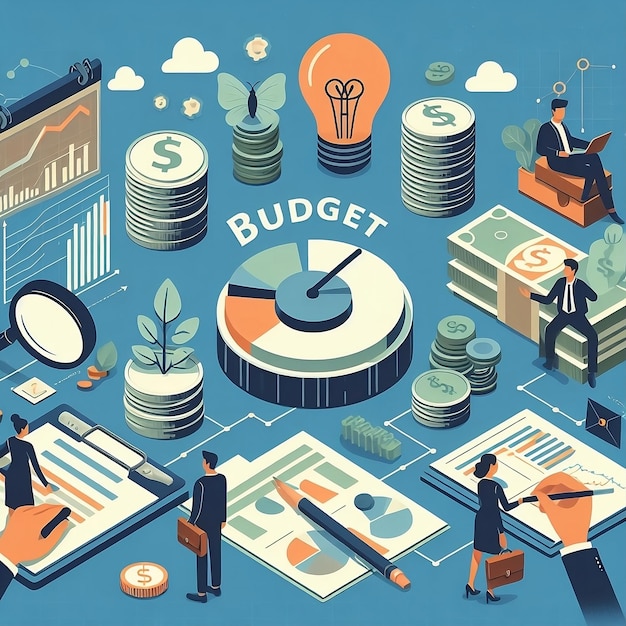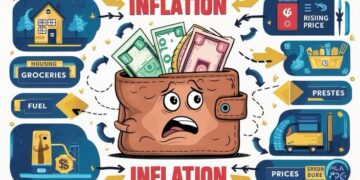In an unpredictable world, mastering personal finance is more crucial than ever. For many, budgeting feels like a restrictive chore, a tedious exercise in deprivation. Yet, when approached strategically, it transforms into an empowering tool—a roadmap to financial freedom, reduced stress, and the ability to achieve your biggest aspirations. As we navigate 2025, economic shifts and technological advancements are continually reshaping how we manage our money. Effective budgeting hacks aren’t just about cutting costs; they’re about optimizing spending, maximizing savings, and building lasting wealth. For content creators, this topic consistently drives high search volume and engagement, making it a goldmine for Google AdSense revenue, as individuals globally seek actionable strategies to take control of their finances. This comprehensive guide will delve deep into innovative budgeting methodologies, leveraging technology, and cultivating financial habits that will not only see you thrive in 2025 but lay the groundwork for a secure future.

Why Budgeting is Your Financial Superpower in 2025
Beyond simply tracking income and expenses, a well-implemented budget offers profound benefits that extend far beyond numerical columns. It provides clarity, control, and peace of mind in an economic landscape that can often feel volatile.
A solid budget helps you:
- Understand Your Cash Flow: It reveals exactly where your money comes from and, more importantly, where it goes. This clarity is the first step to making informed financial decisions.
- Identify Overspending: Without a budget, it’s easy for small, frequent purchases to erode your savings. A budget highlights these “money leaks.”
- Achieve Financial Goals: Whether it’s saving for a down payment, paying off debt, or planning a vacation, a budget provides a structured path to reach your targets.
- Reduce Financial Stress: Knowing you have a plan and that your bills are covered significantly lowers anxiety about money.
- Build an Emergency Fund: Life throws curveballs. A robust budget ensures you’re consistently setting aside funds for unexpected expenses, providing a vital safety net.
- Avoid Debt: By living within your means and allocating funds strategically, you minimize the need to rely on high-interest credit cards or loans.
- Make Intentional Spending Decisions: Instead of impulse buying, a budget encourages conscious choices, aligning your spending with your values.
In 2025, where inflation, interest rates, and global events can shift rapidly, a dynamic and adaptable budget is your shield and your sword, empowering you to navigate financial complexities with confidence.
Core Methodologies: Finding Your Budgeting Style
There isn’t a one-size-fits-all approach to budgeting. The most effective budget is the one you can stick to consistently. Here are several popular methodologies, each with its unique strengths:
A. The 50/30/20 Rule: Simplicity and Structure
This widely acclaimed budgeting rule offers a straightforward framework for allocating your after-tax income. It’s ideal for those seeking a balanced approach without excessive micro-management.
- 50% for Needs: This portion of your income covers essential living expenses.
- Rent/Mortgage Payments
- Utilities (electricity, water, gas)
- Groceries (basic food items)
- Transportation (car payments, public transport fares, fuel)
- Minimum Debt Payments (credit cards, student loans)
- Insurance Premiums (health, car, home) The goal here is to keep your non-negotiable expenses within half of your income. If they exceed this, it’s a strong indicator that you might need to adjust your living situation or find ways to reduce these fixed costs.
- 30% for Wants: This category covers discretionary spending—the things that improve your quality of life but aren’t strictly necessary.
- Dining Out
- Entertainment (movies, concerts, streaming services)
- Hobbies and Recreation
- Vacations
- Shopping for non-essentials (new clothes, gadgets)
- Gym Memberships This segment provides flexibility and allows for enjoyment, preventing budgeting from feeling overly restrictive. The key is to be honest about what constitutes a “want.”
- 20% for Savings and Debt Repayment: This crucial portion is dedicated to building your financial future.
- Emergency Fund Contributions
- Retirement Savings (401k, IRA, pension contributions)
- Investments (stocks, bonds, mutual funds)
- Extra Debt Payments (above minimums, targeting high-interest debt first) This segment ensures you’re consistently working towards financial security and freedom. Automating these transfers is a powerful hack to ensure consistency.
The 50/30/20 rule is simple to implement and provides a quick snapshot of your financial health, making it an excellent starting point for many.
B. The Zero-Based Budget: Every Dollar Has a Job
The zero-based budgeting method is more meticulous, requiring you to assign a purpose to every single dollar of your income until your income minus expenses equals zero. It doesn’t mean you spend all your money; it means every dollar is accounted for, whether it’s spent, saved, or invested.
- Allocate All Income: At the beginning of each month, list your total income. Then, assign every dollar to a specific category (e.g., rent, groceries, utilities, savings, debt repayment, entertainment, charity).
- No Unassigned Funds: The sum of all your expenses, savings, and debt payments should exactly match your income. This leaves no room for “mystery” spending.
- Increased Financial Awareness: This method forces you to be hyper-aware of where your money is going and to make conscious decisions about every expenditure.
- Flexibility and Adjustments: It’s not rigid. If you overspend in one category, you must consciously reduce spending in another to maintain the zero balance. This built-in accountability is very powerful.
Zero-based budgeting is highly effective for gaining granular control over your finances and is particularly beneficial for those with inconsistent incomes or those aggressively trying to pay down debt.
C. The Envelope System: Cash-Based Control
A tactile, hands-on approach, the envelope system is ideal for visual learners and those who struggle with overspending on variable expenses like groceries, entertainment, or dining out.
- Allocate Cash to Envelopes: At the start of the budgeting period (e.g., weekly or bi-weekly), withdraw cash for your variable spending categories. Label separate envelopes for each category (e.g., “Groceries,” “Entertainment,” “Personal Care”).
- Spend Only What’s in the Envelope: Once the cash in an envelope is gone, you cannot spend more in that category until the next budgeting period.
- Prevents Overspending: This physical limitation makes impulse purchases impossible and forces immediate awareness of spending limits.
- Tangible Awareness: Handling physical cash creates a more tangible connection to your money than swiping a card, often leading to more mindful spending.
While less practical for fixed bills (which are usually paid electronically), the envelope system is incredibly effective for discretionary spending control. Modern digital versions (apps simulating envelopes) also exist for those who prefer card payments.
D. The Pay Yourself First Method: Prioritizing Savings
This philosophy prioritizes saving and investing before any other expenses. It’s less about detailed tracking and more about automated discipline.
- Automate Savings Transfers: Immediately upon receiving your paycheck, a predetermined amount (e.g., 10-20% of your income) is automatically transferred from your checking account to your savings or investment accounts.
- Treat Savings as a Fixed Expense: This makes saving non-negotiable. You learn to live off what remains after your savings are taken out.
- Builds Wealth Incrementally: Consistent, automated contributions compound over time, leading to significant wealth accumulation with minimal effort.
- Reduces Temptation to Spend: By moving money out of sight before you can spend it, this method curbs impulse spending.
This method is highly effective for building long-term wealth, emergency funds, and retirement savings, especially when combined with other methods for managing remaining expenses.
Cutting-Edge Budgeting Hacks for 2025

Beyond the core methodologies, leveraging technology, psychological insights, and smart financial practices can supercharge your budgeting efforts in 2025.
A. Leverage Budgeting Apps and Software
Digital tools have revolutionized budgeting, offering automation, insights, and convenience.
- Mint: A popular free app that connects to your bank accounts, credit cards, and investments, automatically categorizing transactions and tracking spending. It offers budgeting tools, bill reminders, and financial goal tracking.
- YNAB (You Need A Budget): A zero-based budgeting app with a strong emphasis on giving every dollar a job. It has a steeper learning curve but is highly effective for disciplined users. It offers robust reporting and goal tracking.
- Rocket Money (formerly Truebill): Focuses on tracking subscriptions, negotiating bills, and identifying opportunities to save. Excellent for finding hidden recurring expenses.
- Personal Capital (now Empower Personal Wealth): Primarily for investment tracking and wealth management, but also offers free budgeting and net worth tracking tools, ideal for those with more complex financial portfolios.
- Monzo/Revolut (Digital Banks): Many challenger banks offer built-in budgeting features, spending categorization, instant notifications, and “pots” or “vaults” for specific savings goals, integrating budgeting directly into your banking experience.
These apps streamline the process, offer real-time insights, and can automate many tedious budgeting tasks.
B. Master the Art of Subscription Auditing
In 2025, the average consumer has numerous recurring subscriptions—many forgotten or underutilized.
- Quarterly Review: Schedule a quarterly review to list all your subscriptions (streaming, apps, gym, software, food boxes).
- Ask the Hard Questions: For each, ask: “Do I actively use this? Is it worth the cost? Are there cheaper alternatives? Can I pause or cancel it?”
- Leverage Apps: Use apps like Rocket Money or directly review your bank statements to catch all recurring charges.
- Negotiate Where Possible: Many services (internet, cable, insurance) are open to negotiation. A quick call can yield significant savings.
This simple audit can free up substantial monthly cash flow.
C. Embrace the “Sinking Fund” Strategy
A sinking fund is a powerful concept within budgeting for irregular, future expenses that are not monthly but are predictable.
- Identify Future Costs: Think about expenses like annual car insurance, holiday gifts, home repairs, new tires, or property taxes. These aren’t monthly bills but are inevitable.
- Calculate Monthly Contributions: Divide the total estimated cost by the number of months until the expense is due to determine a monthly savings target.
- Set Up Separate Savings Buckets: Use a separate savings account, a dedicated “pot” in a digital bank, or a spreadsheet line item to allocate these funds.
- Avoid Debt: When the expense comes due, the money is already saved, preventing you from dipping into your emergency fund or going into debt.
Sinking funds smooth out financial shocks and prevent large, irregular expenses from derailing your budget.
D. Implement the “Wait 48-72 Hours” Rule
This psychological hack combats impulse spending, especially on “wants.”
- Delay Gratification: When you feel the urge to make a non-essential purchase, impose a mandatory waiting period of 48 to 72 hours.
- Re-evaluate Need: During the waiting period, reflect: “Do I truly need this? Is it aligned with my budget? Will I still want it in a few days?”
- Often Leads to No Purchase: The initial excitement often fades, and you realize the purchase isn’t necessary or fits your long-term goals.
This simple pause creates a crucial buffer between desire and action, saving you money on regretted purchases.
E. Automate Everything Possible
Automation is the bedrock of consistent budgeting and saving.
- Automate Bill Payments: Set up automatic payments for all recurring bills (rent, utilities, loans, credit cards) to avoid late fees and missed payments.
- Automate Savings: As per the “Pay Yourself First” method, set up automatic transfers to your savings, investment, and sinking fund accounts immediately after payday.
- Automate Debt Repayment: Set up automatic payments for minimums, and if able, automatic additional payments to high-interest debt.
Automation removes the need for willpower and consistency, making your financial plan execute itself.
F. Conduct a “No-Spend” Challenge
Periodically challenge yourself to a “no-spend” day, weekend, or even a week.
- Define Rules: Clearly outline what you’re allowed to spend money on (e.g., only essentials like groceries, no dining out, no impulse buys).
- Boost Awareness: This forces a deep dive into your spending habits and highlights how much money is spent on non-essentials.
- Reset Habits: It can reset unhealthy spending patterns and build financial discipline.
- Fun and Engaging: Frame it as a game or a challenge to make it less daunting and more motivating.
This hack can provide a powerful jolt to your budgeting efforts and reveal surprising savings.
G. Optimize Your Grocery Spending
Groceries are often one of the largest variable expenses.
- Meal Planning: Plan all your meals for the week before you shop. This reduces impulse buys and ensures you only buy what you need.
- Shop with a List (and Stick to It): A strict shopping list is your best friend. Avoid shopping when hungry.
- Bulk Buying (Smartly): Buy non-perishable items in bulk only if they’re cheaper per unit and you’ll genuinely use them before they expire.
- Compare Prices: Use store apps or online price comparison tools before heading to the store.
- Utilize Loyalty Programs and Coupons: Don’t dismiss the power of discounts.
- Reduce Food Waste: Learn to cook with leftovers, freeze excess, and understand food storage to minimize waste, which is essentially throwing money away.
Small changes in grocery habits can yield significant monthly savings.
H. Review and Adjust Your Budget Regularly
A budget isn’t static. Life changes, and your budget should too.
- Monthly Check-ins: Dedicate 15-30 minutes each month to review your spending against your budget.
- Identify Discrepancies: Where did you overspend? Where did you underspend?
- Make Adjustments: If a category consistently goes over budget, either adjust the budget amount or find ways to cut back. If you have extra income, allocate it to savings or debt.
- Annual Overhaul: Once a year, conduct a more thorough review of your entire financial situation, re-evaluating goals, income, and major expenses.
Regular review ensures your budget remains relevant and effective.
Advanced Budgeting Strategies for Wealth Building in 2025

Once you’ve mastered the basics, you can elevate your budgeting game to accelerate wealth accumulation.
A. The “Snowball” or “Avalanche” Debt Payoff Methods
These strategies specifically target debt repayment within your budget.
- Debt Snowball: List all debts from smallest balance to largest. Pay minimums on all but the smallest, on which you pay as much extra as possible. Once the smallest is paid off, roll that payment amount (plus the minimum you were paying) to the next smallest, creating a “snowball” effect. This method is psychologically motivating as you see debts disappear quickly.
- Debt Avalanche: List all debts from highest interest rate to lowest. Pay minimums on all but the highest interest rate debt, on which you pay as much extra as possible. Once paid off, roll that payment to the next highest interest rate. This method saves you the most money in interest over time.
Choose the method that best suits your motivation and financial situation within your budget.
B. Optimize Your Credit Score
A good credit score can save you thousands over your lifetime through lower interest rates on loans and credit cards.
- Pay Bills on Time: Payment history is the biggest factor. Automate payments to ensure this.
- Keep Credit Utilization Low: Aim to use less than 30% of your available credit.
- Don’t Close Old Accounts: Longer credit history is generally better.
- Check Your Credit Report Regularly: Dispute any errors.
Budgeting responsibly contributes directly to a healthier credit score.
C. Maximize Retirement Contributions
Early and consistent contributions to retirement accounts are a powerful wealth-building strategy.
- Employer Match: Always contribute at least enough to get your employer’s full matching contribution—it’s free money.
- Increase Contributions Annually: Aim to incrementally increase your contribution percentage each year, even by 1%.
- Understand Account Types: Learn about 401(k)s, IRAs (Traditional vs. Roth), and other investment vehicles suitable for your goals.
Budgeting ensures you have the available funds to consistently feed your retirement nest egg.
D. Explore Side Hustles or Income Optimization
A budget helps manage your existing income, but increasing your income provides more financial flexibility.
- Monetize Skills: Can you freelance, consult, or offer services in your spare time?
- Passive Income Streams: Explore options like investing in dividend stocks, creating digital products, or real estate (with caution).
- Negotiate Salary/Raises: Regularly assess your market value and be prepared to negotiate your income.
- Optimize Existing Assets: Consider renting out a spare room, a car, or storage space.
Any additional income can be strategically allocated within your budget to accelerate debt payoff or savings.
Common Budgeting Pitfalls to Avoid in 2025
Even with the best intentions, budgeting can go awry. Being aware of common pitfalls can help you steer clear.
A. Unrealistic Budgets: Setting overly aggressive or restrictive spending limits often leads to burnout and abandonment. Be realistic about your lifestyle and gradually adjust. B. Ignoring Small Expenses: The “latte factor” is real. Small, daily purchases add up quickly. Track them all. C. Not Tracking Everything: Every dollar needs a job. If you’re not tracking all income and outgo, your budget has blind spots. D. Giving Up After One Slip-Up: No one budgets perfectly. If you overspend in a category, acknowledge it, adjust, and move on. Don’t let one mistake derail your entire plan. E. Lack of Flexibility: Life is dynamic. Your budget should be too. Be prepared to adjust categories as your income, expenses, or goals change. F. Not Budgeting for Irregular Expenses: Failing to plan for annual insurance payments, car repairs, or holiday gifts can lead to financial shocks. Use sinking funds. G. Not Communicating with Partners/Family: If you share finances, everyone needs to be on the same page and committed to the budget. H. Focusing Only on Cutting, Not Earning: While cutting expenses is important, also explore ways to increase your income to accelerate goals.
Budgeting as a Path to Financial Flourishing
In 2025, budgeting is far more than a financial chore; it’s a dynamic, empowering practice that serves as the bedrock of financial stability and future prosperity. By embracing proven methodologies like the 50/30/20 rule or zero-based budgeting, leveraging cutting-edge technology with intuitive apps, and adopting smart hacks like subscription auditing and sinking funds, anyone can gain unprecedented control over their money.
The journey towards financial mastery is not about perfection but about consistent effort and continuous adaptation. A well-crafted budget empowers you to make intentional spending choices, dismantle debt, build robust savings, and confidently pursue your most ambitious financial goals. It transforms the daunting task of money management into a clear, achievable path toward reduced stress, increased financial literacy, and ultimately, a life of greater freedom and security. By integrating these budgeting hacks into your daily routine, you’re not just managing money; you’re actively designing a more resilient, prosperous future for yourself and your loved ones. Start today, and unlock the financial potential that awaits you in 2025 and beyond.







